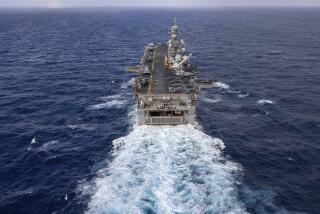Don’t Let Allies Off Hook, Aspin Warns Weinberger : Says Losing Men Could Set Off U.S.
- Share via
WASHINGTON — Armed Services Committee Chairman Les Aspin warned the Reagan Administration today not to let the allies off the hook in protecting Persian Gulf shipping, predicting that U.S. deaths while Europeans motor along on gulf gasoline would “set this country off like a tinderbox.”
The Wisconsin Democrat told Defense Secretary Caspar W. Weinberger at a hearing on plans to let 11 Kuwaiti tankers fly the U.S. flag that terming the allied presence “substantial” merely gives Europe and Japan an escape from providing additional help.
Weinberger replied that the Administration is seeking cooperation from allies on the matter.
“You have to be a little careful about statements on what our allies are doing,” Aspin said. “Our allies ought to do more and I think the Administration is pretty close to defending the allies.”
“This is the vortex of the storm, allied cooperation. . . . Everyone in Congress thinks the allies aren’t doing enough. I’m pointing that out as a political fact of life,” Aspin said.
“Do not let them off the hook in any way, shape or form or this policy’s going down the drain in Congress. . . . If we end up with American boys losing their lives in the Persian Gulf and you’ve got cars in Europe shooting down the Autobahn using up the gas, that’s just going to set this country off like a tinderbox,” he added.
Flags on Ships by Month’s End
Weinberger said he expected the process of putting the U.S. flag on the 11 tankers to be completed by the end of the month. U.S. Navy escorting would not begin until “all the forces are in place” to protect the two or three a month that would move through the gulf.
The defense secretary declined to comment publicly on whether gulf contingency plans included the option of a preemptive strike on Chinese-built Silkworm missiles acquired by Iran, but he did say that once the missiles are ready for deployment they could be ready to fire “in a very short time.”
Kuwait asked the United States for U.S. flag protection earlier and also arranged to lease three tankers and get escorts from the Soviet Union. Iran considers Kuwaiti shipping a target in its 6 1/2-year war with Iraq because Kuwait, although officially not involved in the war, has helped funnel arms to Iraq.
Weinberger also said the United States would “regard any additional Soviet presence in the gulf as an unwelcome threat.”
‘Certainly Not at Peace’
Both Weinberger and Adm. William Crowe Jr., chairman of the Joint Chiefs of Staff, said the gulf is not a war zone and commerce continues there. But, added Weinberger, it is “a very ambiguous tactical environment (that is) . . . certainly not at peace either.”
Weinberger was questioned by Rep. Ronald V. Dellums (D-Berkeley) about the contradictory nature of arms sales to Iran, a move that began as a way to seek better relations with Iran, and talk of a preemptive strike against Iran’s Silkworm missiles that could attack shipping in the Strait of Hormuz.
“You can’t get better relations, no matter how well motivated. It’s impossible with the kind of lunatics we have in Iran now,” Weinberger said.
Weinberger also told the committee that seeking U.S. flag protection is not new. Since 1981, he said, about 50 vessels have obtained the U.S. flag, including four oil tankers.
More to Read
Sign up for Essential California
The most important California stories and recommendations in your inbox every morning.
You may occasionally receive promotional content from the Los Angeles Times.













